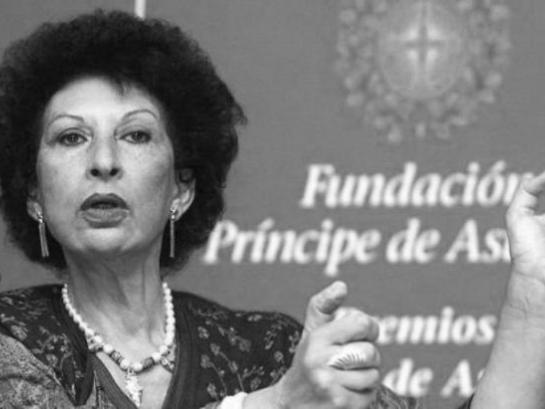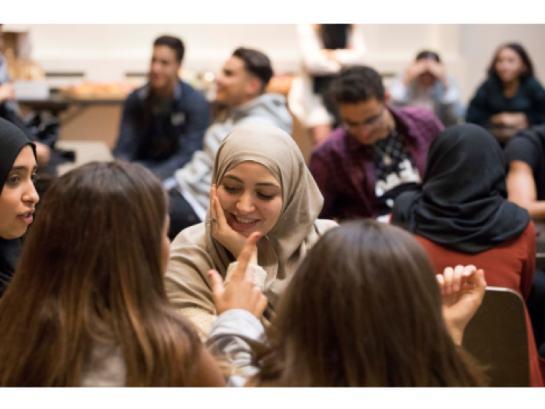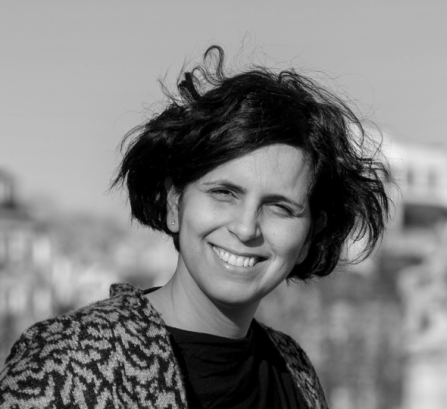About the Fatima Mernissi Chair
Fatima Mernissi (27/09/1940 - 30/11/2015) was a prominent Moroccan sociologist who greatly impacted the development of feminism in the muslim community.
Her book Beyond the Veil
Inspired by this grande dame, the Fatima Mernissi Chair creates spaces for open dialogue between public figures, civil society, artists, activists, youth, etc. It builds on the cosmopolitan surroundings of Brussels and critical thinking tradition at the VUB, to incite interdisciplinary research and organize lectures and workshops for the broader public on power, gender and islam.
The Fatima Mernissi Chair is an initiative by Rhea and collaborates with many different people and organisations to achieve its' goals.


Upcoming
29/11/2025: Annual Hommage to Fatima Mernissi
- Screening & Performance - Saâd Chraïbi: un auteur, un livre, un film
Recent initiatives
2024:
- Screening & Talk on Frames of Resistance - Jocelyn Saab: Annual Hommage to Fatima Mernissi
- Watch & Read: Féminité et sexualité en Islam: hier et aujourd’hui - with Soumaya Guessous
2023:
Annual Hommage to Fatima Mernissi:
- Het Salon van Fatima
- The Fatima Sessions
- Fiets-en wandeltocht: In het spoor van Fatima Mernissi
- 2020 - 2023: AflamNa (Onze films): forum voor genderstereotypen, seksualiteit en macht adhv films uit de Maghreb en het Midden-Oosten
Current Chairholder: Prof. Dr. Iman Lechkar
Iman Lechkar researches Islam forms in the West and specialises in the anthropology of Islam, multiculturalism, critical theory, gender theory, Islamic studies, and Middle Eastern politics and history. In both her research and teaching, Iman Lechkar seeks to connect different intellectual, social, cultural and historical traditions.
Finally, she is also involved in civil society in Brussels and Antwerp where she tries to shape the debate around Islam, diversity and minorities in the Belgian context.

| Iman Lechkar holds a master's degree in applied translation English-Spanish-Arabic, a MaNaMa in International relations and diplomacy and a PhD in social and cultural anthropology. Her linguistic and human, cultural and social science expertise allows her to analyse and teach social trends from an interdisciplinary perspective. Her involvement is mainly in higher education. She has conducted doctoral and postdoctoral research at KULeuven and taught at Odisee University College within the social work programme. |
Vision & Mission
The Fatima Mernissi Chair has an academic and a society-oriented pillar.
Within the academic pillar, scientific research is set up with the following focal points:
- The so-called ‘Muslim question’, in particular the framing of power, gender and Islam in current scientific and societal debates. Special attention will be paid to innovative and critical voices.
- Identity and perception of identity among Muslim populations in Europe, with a particular focus on young people. Here we focus on new ideas and practices growing within Muslim populations themselves. These include identity formation and the interpretation of ‘masculinity’ and ‘femininity’, of ‘feminism’ and ‘Islam’
- Possibilities and limitations of the current political structures and cultures of contemporary liberal democracies in the light of the integration of Islam in Europe
- Brussels and its various dynamics and communities.
The second, society-oriented pillar involves a dialogue between science and society (opinion makers, civil society organisations, artists, activists and stakeholders of all kinds) on the broad theme of power, gender and Islam.
Within academia, many researchers and thinkers are already working on these themes, critically interpreting Islam and examining the role of gender, power and religion in societal problems. However, the knowledge produced here is not always accessible to a wide audience. Nor should the research that will be launched in the context of the chair remain on the VUB campus and be able to play an important role in promoting living together in a city like Brussels. Moreover, various initiatives are also already being developed in civil society to critically rethink Islam and look for ways to shape coexistence in a positive way. By creating a platform for social debate, we believe VUB can make an important and constructive contribution in a mutual exchange of knowledge.
What have we done in the past?
Events
| 2019 | Femme et Pouvoir. La lutte contre la législation défavorable aux femmes |
| Vergeten koninginnen: vrouwen aan de macht | |
| 2018 | Hommage aan Fatima Mernissi |
| Fatima Mernissi Boekenkaravaan met Nadia Dala en Rachida Lamrabet | |
| 2017 | Hommage aan Fatima Mernissi |
| Fatima Mernissi Leerstoel - Het schrikbeeld van de Arabische moslimman | |
| Slam the City: Music and Muslim Youth Culture | |
| Iman Lechkar: 'Moeten moslimvrouwen gered worden? | |
| Master Gender en Diversiteit: lancering leerstoel Fatima Mernissi | |
| 2016 | Kaaitheater: een ode aan Fatima Mernissi |
Slam the City:
Het project Slam the City vertrok vanuit de nood om positieve dynamieken te creëren die oplossingen bieden voor cruciale samenlevingsvraagstukken die op de grootstad inbeuken. Slam the city verwijst naar het gebons waarmee de grootstad Brussel geconfronteerd wordt en biedt een forum aan om die energie op een constructieve en creatieve manier aan te wenden om een inclusiever en samenhangender Brussels weefsel te creëren.
Fatima Mernissi Boekenkaravaan:
De Fatima Mernissi Boekenkaravaan wilde door middel van literatuur Brusselse jongeren kennis laten maken met een artistieke en maatschappelijk relevante discipline en hen inspireren door hen in dialoog te laten gaan met verschillende auteurs, in het bijzonder Vlaams-Marokkaanse auteurs. Het project vond haar inspiratie in de burgerkaravaan (caravane civique) die Fatima Mernissi oprichtte om kansarme burgers te versterken in hun ontwikkeling en burgerschap.
Vergeten koninginnen: vrouwen aan de macht
Vergeten koninginnen is geïnspireerd op een van de boeken van Fatima Mernissi, namelijk Sultanes oubliées, Femmes chefs d'Etat en Islam of in het Nederlands: Sultanes, de macht van vrouwen in de wereld van de islam. Fatima Mernissi onderstreepte in het boek de sterke traditie van vrouwelijke leiders in de islamitische wereld. In een driedelige activiteitenreeks over vrouwen en macht wil het project inzoomen op mechanismen die ervoor zorgen dat de mannelijk elite blijft voortbestaan en versterkt wordt, en daardoor het vrouwelijke potentieel beknot of onzichtbaar maakt. ‘Vergeten Koninginnen’ beoogt door middel van laagdrempelige lunchgesprekken en grotere publieke evenementen met Marokkaanse, Belgische en internationale sprekers, Brussel te informeren over onzichtbare mechanismen die zowel in het Westen als in de Arabische wereld verhinderen dat vrouwen gelijk behandeld worden. Tot slot brengen de concerten vergeten of ongekende koninginnen op het podium die de kracht van vrouwen bezingen en erin slagen om verschillende gemeenschappen te ontroeren en te verbinden.
